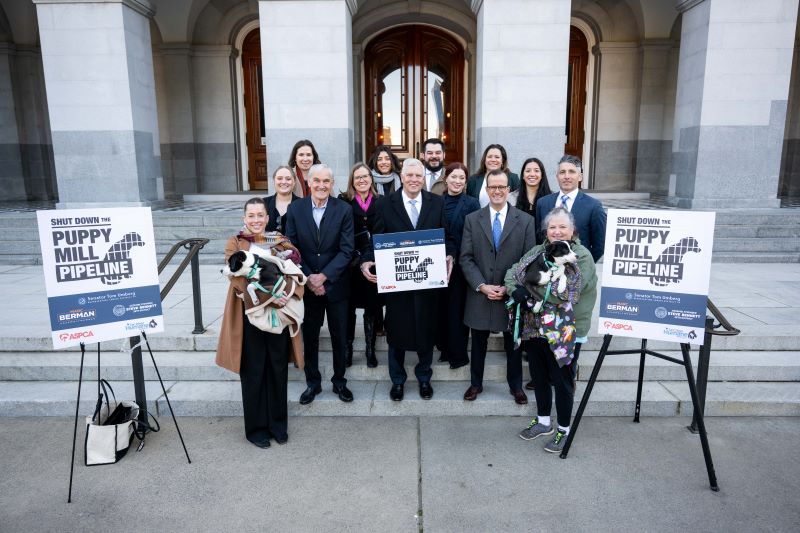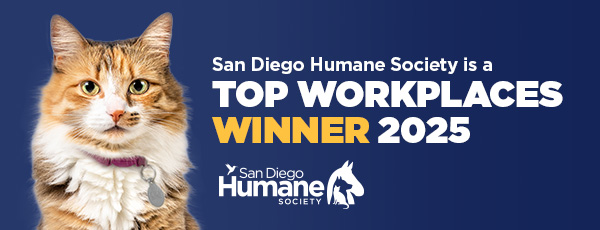San Diego Humane Society Sponsors Bills to Stop the Puppy Mill Pipeline in California
SB 312, AB 506 and AB 519 aim to protect consumers and dogs from pet industry’s deceptive practices
SACRAMENTO, CA (Feb. 11, 2025) — In response to a groundbreaking multi-part investigation into the puppy market in California by the Los Angeles Times this fall, Senator Tom Umberg and Assemblymembers Steve Bennett and Marc Berman jointly introduced legislation sponsored by San Diego Humane Society today in Sacramento to curb consumer fraud and abuse in California.
Standing side-by-side with colleagues, animal advocates and puppies from Sacramento County Animal Services, the legislators all declared their commitment to ending the puppy mill pipeline in California, once and for all with the introduction of three measures, all jointly sponsored by the ASPCA (The American Society for the Prevention of Cruelty to Animals) and San Diego Humane Society.

Senator Tom Umberg and Assemblymembers Steve Bennett and Marc Berman standing alongside by their partners at San Diego Humane Society and The ASPCA after introducing bills to stop the puppy mill pipeline to California.
Senator Thomas J. Umberg (D-Santa Ana), author of Senate Bill 312, noted “As chair of the Senate Judiciary Committee and a rescue dog owner myself, I am appalled by what the Los Angeles Times has uncovered in its investigation into, and exposure of, extensive fraud and suffering in the puppy trade. Like many, I have been under the impression that advocacy and awareness of this issue had largely reduced or eliminated the puppy mill business in California. I’m proud to be authoring SB 312 as a part of this important package to protect consumers moving forward.”
SB 312 mandates that dog importers submit health certificates electronically to the California Department of Food & Agriculture within 10 days of shipment and requires those certificates to be made publicly available. This health certificate information is crucial for individual consumers to confirm information about their dog and is also helpful to humane law enforcement agencies as they work to investigate fraud and malfeasance.
“Choosing our fur-ever companions is a meaningful, life-changing process. Families are entitled to know where their new dog/cat comes from, and the conditions in which their pet grew up,” said Assemblymember Steve Bennett (D-Oxnard). “By requiring sellers to provide more information up front and prohibiting the use of non-refundable deposits as a “paywall,” Assembly Bill 506 will empower families in the adoption process.”
Assemblymember Bennett’s AB 506 voids contracts between California consumers and online pet brokers that require a nonrefundable deposit and/or fail to disclose the original source of a dog or cat prior to a deposit being issued. The bill also requires sellers to return money to the buyers within 30 days if the contract is voided.
The third bill of the Stop the Puppy Mill Pipeline is Assembly Bill 519, authored by Assemblymember Marc Berman, (D-Palo Alto), Chair of the Assembly Business & Professions Committee. AB 519 ends pet brokering in California by defining “brokers” as any person or business that makes a profit by selling animals bred and raised by another, and prohibits said people from selling or “adopting out” pets for a profit.
“I was shocked to learn that bad actors are getting around California's ban on puppy mills by claiming to be local breeders, when in reality they're buying abused and neglected puppies from cruel out-of-state breeding operations and selling them to unsuspecting pet parents," said Assemblymember Marc Berman. “As Chair of the Business and Professions Committee, every year I see advocates and animal lovers push for improvements to animal welfare in California. After reading the LA Times exposé, and as a dog dad myself, it was clear to me that we must do more to improve both animal welfare and consumer protection in our state. My bill will crack down on those that represent to be small, local home breeders, when they are actually importing puppies bred in puppy mills in states with inhumane animal welfare laws.”
The Times’ investigation found that “truckloads of dogs from profit-driven mass breeders pour into California every year from the Midwest, and then resold by people claiming to be small, local home breeders.” Misleading marketing tactics, predatory financial behaviors, and a gap in regulations are allowing these online brokers to take advantage of consumers and allowing puppy mills to continue to reach Californians when searching for a new companion.
“Consumers deserve complete transparency about the flood of puppies entering our state—this is not just about protecting people from unhealthy pets, but about stopping the cruel pipeline from puppy mills,” said Dr. Gary Weitzman, president and CEO of San Diego Humane Society. “These bills are critical to closing dangerous loopholes in California’s pet sales ban, and they will help us shut down the inhumane practices that exploit animals for profit.”
“California has long been a leader in animal welfare, including being the first state to stop puppy mills from selling through their largest outlet – pet stores. Unfortunately, puppy mills shut out from the retail market still ship puppies into California using deceptive websites and middlemen,” said Brittany Benesi, senior legislative director for the ASPCA, Western division. “Together, the three bills introduced by Senator Umberg, Assemblymember Berman, and Assemblymember Bennett address the pet industry’s most deceptive tactics to prevent them from profiting off of unsuspecting consumers looking to add a new pet to their family, and expand on California’s commitment to ending the puppy mill pipeline for good.”
At a time when California shelters are overflowing with adoptable puppies, kittens, dogs and cats, SB 312, AB 506 and AB 519 will provide transparency in the sales process and protect both consumers and animals alike. All three measures will be heard in policy committees in March or April.
You can learn more about each bill by clicking on the links here for SB 312, AB 506 and AB 519.
Published: February 11, 2025








